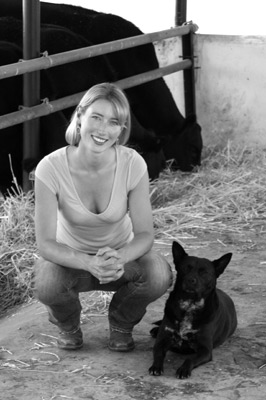Having a Cow : Calmly
Rancho San Julian Brings Santa Barbara the Beef

Driving up the 101, the fog is as thick as that stuff for which Andersen’s in Buellton is famous. For all I know, a young Dustin Hoffman passed me going the wrong way in the Gaviota tunnel. But when I arrive in Lompoc, a bit up Highway 1, my goal is miraculously fog free-gorgeously rolling green hills, an impressive farmhouse, and, soon, some very happy, munching cows. This is Rancho San Julian, the current answer to “where’s the beef?” in Santa Barbara County.
Elizabeth Poett, the person in charge of the beef operation, answers my questions while always keeping one eye on her charges, 20 or so head of cattle, many of whom keep an eye on us, curious creatures that they are. I ask if they’re wondering what I’m writing, but Poett says, “They just want to know if you have any barley.” Rancho San Julian cows eat only three things, spending most of their time on the hillside pastures, while also getting hay, alfalfa, and barley. “We crush the barley, as it’s better for their stomachs,” Poett explains. “At larger places, they corn-finish the animals without letting their stomachs adjust.”
That’s not the San Julian way. The unspoken motto is happy cows make better beef. Plus, as Poett (who, it must be said, is the daughter of The Independent’s editor-in-chief Marianne Partridge) puts it, “Because it’s not corn-finished, the meat has a beefier taste. It’s how you’d imagine it was in older times. ‘The beef tastes beefier,’ is what people have been saying to me. People have been crazy for the burger meat.”
There might be no better testament to that burger meat than this: The Hungry Cat, which otherwise is a seafood only restaurant, serves a justifiably admired “Pug” burger. They make it with Rancho San Julian beef. Square One is the other Santa Barbara restaurant to serve their beef, a hint the best chefs in town are already in on the ground floor of the beefy goodness. But so can anyone who shops the Tuesday and Saturday Farmers Market in Santa Barbara, and soon the cows will go online at ranchosanjulianbeef.com.
While Elizabeth has been managing the beef operation for only three years, the land has been providing beef for Santa Barbara for nearly two centuries, feeding the Presidio back in the early 1800s. “I feel honored that I can be part of that,” she said. “It says a lot in the name, its history and tradition.” It was her father, James Poett, who founded the Rancho San Julian Cattle Company in 1980. The Beef Company followed seven years later. “He was a total pioneer in organic meats,” Elizabeth explained. “They didn’t let him into farmers markets as they didn’t believe meat could be organic.” Although James Poett was instrumental in drawing up laws about organics, “it drifted, it became so impossible, so expensive,” Poett said. “We’d have to ship in hay from god knows where to have it be certified organic.”
Instead the farm follows healthy and humane practices and buys feed locally or grows it on the ranch. More importantly, Poett points out, “I know their background, know their whole vaccination history, and we never give them hormones.” Ultimately she’s on a mission to find where taste and environmentally sound practices meet. The ranch’s Web site insists she offers “the new generation’s perspective,” and when asked about that, she replies, “Because the ranch has been in the family-my little cousin is ninth generation-for so long, you have to change with the times to make sure you keep the ranch in the family. Keeping the cattle is the way. How to make money off the land is the way to go.”
Crucial to that effort is the completion of the Central Coast Agricultural Coop’s mobile harvesting unit, which looks just like a semi-trailer from the outside and is parked a 100 feet from the feeding station. “It will enable small ranchers and farmers to sell their meat and produce online,” Poett said. “Having to drive cattle miles for harvesting costs so much money. With the mobile unit, it will be the same price but you won’t have to move your animals, so they will have less stress. They will be born and raised on the same ranch all their lives.” The unit, built along guidelines established by esteemed designer of livestock handling facilities Temple Grandin, is still awaiting final USDA approval.
In the meantime, Poett asserted, “Environmentalists and cattlemen have their beefs, no pun intended, but we really want the same thing. When I think about the ranch in 15 to 20 years, I want it to be the same.” And even if Rancho San Julian begins to sell more beef, Poett herself will be at the Farmers Markets. “I’m hoping more people kind of understand local beef,” she said. “I want people to feel they have a relationship with the person who is growing the animals.”
4•1•1
See ranchosanjulianbeef.com for more info.



